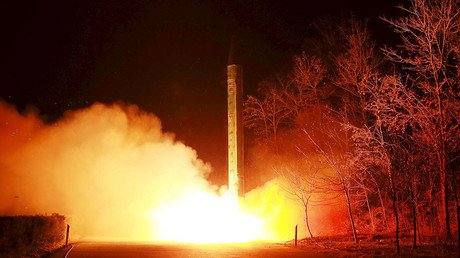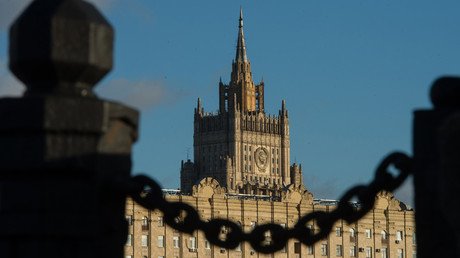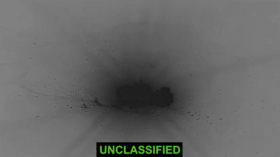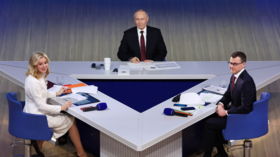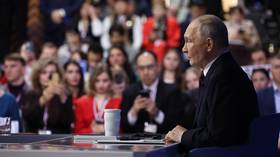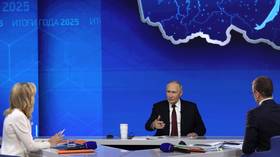Pyongyang claims successful simulation of preemptive nuclear strikes on US targets in S. Korea
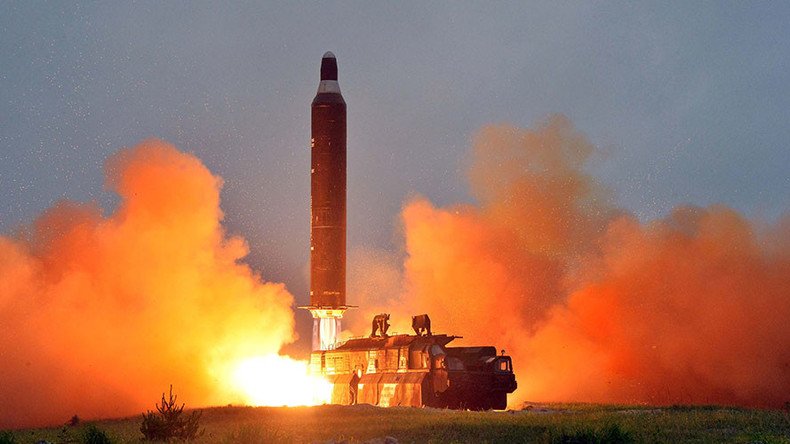
North Korea has boasted about the successful completion of its latest ballistic missile test which demonstrated Pyongyang’s capability to launch a pre-emptive strike on South Korea’s ports and airfields hosting the “US imperialists' nuclear war hardware.”
Pyongyang launched three projectiles in the eastward direction between 5:45am and 6:40am Tuesday, from an area near the North Korean city of Hwangju. The missiles, two Scuds, and one Rodong, flew some 500 to 600 kilometers before crashing into the East Sea, South Korea's joint chiefs of staff announced. The distance is more than that required to hit any part of South Korea.
On Wednesday, the North’s Korean Central News Agency (KCNA), revealed that the test had been carried out by Hwasong artillery units of the KPA Strategic Force, under the watchful eye of the country’s leader Kim Jong Un and General Kim Rak Gyom, commander of the Strategic Force.
The drill “demonstrated the combat capability of the Hwasong artillery units,” under simulated conditions of “making preemptive strikes” at ports and airfields in South Korea where the “US imperialists’ nuclear war hardware is to be hurled,” the statement said.
The test also helped examine the “operational features of the detonating devices of nuclear warheads” mounted on the ballistic rockets at the “designated altitude over the target area.”
Tuesday launch was Pyongyang’s latest show of force after the US and South Korea agreed to place Terminal High Altitude Area Defense (THAAD) missile interceptor system in Seongju, some 200 miles southeast of Seoul. On July 9, North Korea fired a submarine-launched ballistic missile (SLBM) also against the decision to by the US to station its missile defense system at its borders.
READ MORE: N. Korea test-fires submarine-launched ballistic missile
"Given the missile launches come after the decision to deploy the Terminal High Altitude Area Defense (THAAD) system in the southern county of Seongju, it can be interpreted as Pyongyang's clear message that it can attack Seongju and any other part of South Korea," JCS spokesman Jeon Ha-kyu said in a press briefing.
The North’s relentless drive to test its nuclear-capable technology and repeated threats to strike the US and its allies has once again been condemned by its neighbor and by Washington.
"The [South Korean] government strongly condemns the latest launch, which is a blatant violation of relevant United Nations resolutions and a provocation threatening the safety and peace of the Korean Peninsula as well as the region," Cho June-hyuck, the Ministry of Foreign Affairs' spokesman, said during a press briefing. "We urge North Korea to stop this kind of provocation immediately."
The United States Strategic Command, while confirming the launch of two Scud tactical ballistic missiles and Rodong medium-range ballistic missile said the rockets "didn't pose a threat to North America.”
"We strongly condemn this and North Korea's other recent missile tests, which violate UN Security Council Resolutions explicitly prohibiting North Korea's launches using ballistic missile technology," said Commander Gary Ross, spokesman for the Pentagon. "We intend to raise our concerns at the UN to bolster international resolve in holding [North Korea] accountable for these provocative actions."
The UN also condemned the latest launch calling the firing of missiles “deeply troubling.”
“Such actions are not conducive to reducing tensions on the Korean Peninsula," said Farhan Haq, deputy spokesman for UN Secretary-General Ban Ki-moon, during a regular briefing.
